|
|
|
Sort Order |
|
|
|
Items / Page
|
|
|
|
|
|
|
| Srl | Item |
| 1 |
ID:
092397
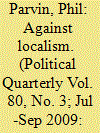

|
|
|
|
|
| Publication |
2009.
|
| Summary/Abstract |
The continued decline in levels of political engagement among British citizens has led many politicians, commentators and academics from across the political spectrum to advocate a move toward a more direct form of democracy via some kind of localism. The claim is that citizens feel increasingly estranged from the democratic process, and from those organisations on which they have historically relied to represent them within the political system. Consequently, localists argue, there now exists a gap between the people, the institutions which are supposed to work on their behalf, and the decisions made in their name, so the system needs to be reformed in such a way as to give individuals and local communities more of a direct input into the decision-making process. Calls for a more direct form of democracy via localism are popular among members of the progressive left and the 'new Conservative' right, and have become so dominant in political discourse that it is often suggested that 'we are all localists now'. This article raises questions about the localist agenda, and suggests that the adoption of a more direct form of democracy in Britain may not only fail to address the decline in political engagement, but may also result in the exclusion, marginalisation, and oppression of minority groups
|
|
|
|
|
|
|
|
|
|
|
|
|
|
|
|
| 2 |
ID:
092399
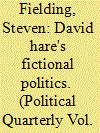

|
|
|
|
|
| Publication |
2009.
|
| Summary/Abstract |
David Hare is Britain's leading political dramatist. His Gethsemane premiered in November 2008, amidst anticipation that the play would 'crucify' New Labour. Gethsemane is in fact one of a number of fictionalisations of New Labour produced since 1997. These works have generally held up the party under Tony Blair's leadership to unmitigated criticism. Gethsemane certainly took Blair's premiership to task. However, despite increasing popular cynicism about Westminster politicians, Hare also suggested that politics remains a potential means through which honourable ends might still be achieved. However, already primed by the prevailing hostility to New Labour encouraged by earlier fictionalisations, few of those who reviewed Gethsemane noted Hare's tentative message of hope.
|
|
|
|
|
|
|
|
|
|
|
|
|
|
|
|
| 3 |
ID:
092394
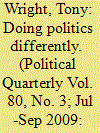

|
|
|
|
|
| Publication |
2009.
|
| Summary/Abstract |
A discussion of how politics is done in Britain, and how it could be done differently. It explores the relationship between culture and structure in politics, and between strong government and effective accountability. The argument is that the concentration on structures can lead to a neglect of the importance of political culture. It suggests that there are three democratic levels, and that Britain does better on one than on the others; and identifies a range of democratic issues to be tackled. It concludes by suggesting that even without major instrumental changes there are cultural changes that would make a difference to how politics is done in Britain.
|
|
|
|
|
|
|
|
|
|
|
|
|
|
|
|
| 4 |
ID:
092406
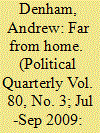

|
|
|
|
|
| Publication |
2009.
|
| Summary/Abstract |
The Conservative Party is the oldest of the 'mainstream' British parties, but has only elected its leader since 1965. In this article, I explain the variety of methods used by the Party to select its leader and assess the impact of 'democratisation' over time. I begin by examining the informal 'system', known as the 'magic circle', which existed until 1965, and explain how and why it came to be abandoned. I then discuss the six elections between 1965 and 1997, when the Tory leader was chosen exclusively by the Party's MPs. Finally, I assess the impact of the 'Hague rules', according to which Party members have the final say, between their adoption in 1998 and the election of David Cameron in 2005.
|
|
|
|
|
|
|
|
|
|
|
|
|
|
|
|
| 5 |
ID:
092413
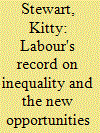

|
|
|
|
|
| Publication |
2009.
|
| Summary/Abstract |
In its first years in office, the Labour Government set out a wide-ranging and ambitious set of policies aimed at reducing poverty, inequality and social exclusion. A decade on, with the party facing probable catastrophic defeat in the next general election, how far can these ambitions be said to have been met? This article summarises the evidence. It also examines the most recent government White Paper on social mobility, New Opportunities: Fair Chances for the Future, published in January 2009, and asks whether this paper represents a serious last attempt to renew the equal opportunities agenda.
|
|
|
|
|
|
|
|
|
|
|
|
|
|
|
|
| 6 |
ID:
092398


|
|
|
|
|
| Publication |
2009.
|
| Summary/Abstract |
This paper reviews two contrasting approaches governments use to engage the citizen to promote better public policy outcomes: nudging citizens using the insights of behavioural economics, as summarised by Thaler and Sunstein (2009) or giving citizens the space to think through and debate solutions, as indicated by proponents of deliberative democracy. The paper summarises each approach, giving examples; then it compares and contrast them, illustrating their relative strengths and weaknesses. The paper concludes by suggesting that the approaches share some common features and policy-makers could useful draw upon both.
|
|
|
|
|
|
|
|
|
|
|
|
|
|
|
|
| 7 |
ID:
092395


|
|
|
|
|
| Publication |
2009.
|
| Summary/Abstract |
In May 2009, revelations made in The Daily Telegraph about the way that MPs had used and abused the House of Commons expenses and allowances regime threw the British political system into turmoil, forced the resignation of the Speaker of the Commons along with a number of implicated MPs, and ignited talk about a crisis in parliamentary democracy and a collapse of public trust in politics. This article explores the events that led to this situation, from the structure of MPs pay and allowance system, the Freedom of Information context that framed the disaster, and the crisis of transparency which the House of Commons has itself precipitated. It argues that, talk of parliamentary reform aside, MPs must radically rethink the way that they approach their representative role and the nature of their broader engagement with the public they claim to serve.
|
|
|
|
|
|
|
|
|
|
|
|
|
|
|
|
| 8 |
ID:
092412


|
|
|
|
|
| Publication |
2009.
|
| Summary/Abstract |
This article examines the pronouncements and positions of the leading political parties on the Human Rights Act and the proposals for a new British Bill of Rights and Responsibilities. It analyses the main arguments made in support of a British Bill of Rights and Responsibilities, which are advanced around five main issues: security, the judges, parliamentary sovereignty, responsibilities and 'British rights'. The article was written before the government published the Green Paper Rights and Responsibilities: developing our constitutional framework in March 2009 and provides a political context with which to analyse it.
|
|
|
|
|
|
|
|
|
|
|
|
|
|
|
|
| 9 |
ID:
092396


|
|
|
|
|
| Publication |
2009.
|
| Summary/Abstract |
There is a range of evidence pointing to the problem of overload on government ministers in both the UK and other Westminster-system countries. This article reviews evidence from the time of Gladstone to the present day, concentrating on evidence relating to the last twenty five years. It surveys the comments and opinions of serving and retired politicians and of academic commentators, assessing the contention that the burden on ministers has increased, is likely to continue to increase, and ought to be diminished. It goes on to look at what have been put forward as potential solutions and explores the extent to which they might offer some respite. Finally, the article concludes that the remedy to the problems involved largely lies in the hands of ministers and their closest advisers, and suggests that it is in all our interests that options to reduce overload should be further explored and implemented.
|
|
|
|
|
|
|
|
|
|
|
|
|
|
|
|
| 10 |
ID:
092409
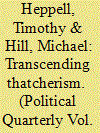

|
|
|
|
|
| Publication |
2009.
|
| Summary/Abstract |
This paper examines the voting motivations of Conservative parliamentarians in the final parliamentary ballot of the Conservative Party leadership election of 2005. By constructing a data set of the voting behaviour of Conservative parliamentarians in the final parliamentary party ballot, and by determining the ideological disposition of the 2005 PCP this paper examines the ideological disposition of the candidates' vis-à-vis their electorate. The paper identifies the increasing Thatcherite nature of the PCP across three dominant ideological divides of contemporary British Conservatism-economic, European, and social, sexual and moral policy. Through such an analysis the paper demonstrates how the modernising David Cameron, who came first in the final parliamentary ballot and then won the membership ballot, transcended the traditional ideological voting motivations of candidates' vis-à-vis their electorate. Most significantly, the paper demonstrates that the European ideological policy divide was not a factor in the succession contest, unlike the succession contests of 1990, 1997 and 2001.
|
|
|
|
|
|
|
|
|
|
|
|
|
|
|
|
| 11 |
ID:
092411


|
|
|
|
|
| Publication |
2009.
|
| Summary/Abstract |
The Lords beats the Commons hands-down in scrutinising legislation, but it is also a repository of informed opinion to serve the nation. It is, that is, so long as it remains appointed not elected.
|
|
|
|
|
|
|
|
|
|
|
|
|
|
|
|
|
|
|
|
|